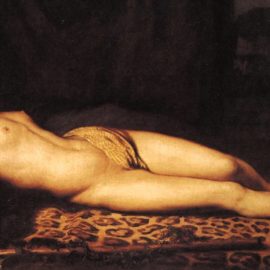

This article is an excerpt from the Shortform book guide to "A New Earth" by Eckhart Tolle. Shortform has the world's best summaries and analyses of books you should be reading.
Like this article? Sign up for a free trial here .
What is the main cause of materialism? Why are we so obsessed with owning the best material possessions our money can buy? What are the consequences of being so materially oriented?
According to spiritual teacher Eckhart Tolle, materialism stems from the ego’s fear of being nothing. This fear drives the ego to seek superiority, and accumulating material possessions is one of the ways to attain it. This ego-driven obsession with materialism is what drives consumerism, which depletes resources and pollutes the planet.
Here’s what causes materialism, according to Tolle.
Material Elements
Material elements are the physical things that we identify with,—typically our possessions and our physical body. For example, your clothing, hairstyle, and home tend to represent the image you see of yourself and how you want to be seen by others. We alter these physical elements based on the self-image we want to present.
Our ego constantly desires more and higher-quality material elements because of our need for superiority—there’ll always be someone with more than us, and this knowledge reignites our fear of being nothing. When we acquire “better” material elements, we lessen that fear. For example, this urge manifests itself as the need to dress in the newest trends or get rhinoplasty to fit the current beauty standard. You do these things to alter your image so your ego and other people see you as “good enough” or “better.”
This obsession with materials has led our consumer society and economy to a place where the only measure of success is having more, which has resulted in greed, pollution, and depletion of resources—one aspect of human dysfunction.
(Shortform note: Scientists explain that human consumerism is severely undermining natural systems and making it increasingly difficult for the poor to meet basic needs. Our incessant desire for highly processed foods, bigger houses, nicer cars, and the accumulation of non-essential goods is depleting the planet’s water supply, natural resources, and diverse ecosystems. They add that roughly 37% of the planet’s species could become extinct as a result.)
Materials Create and Represent Our Identity
Psychological research on people’s attachment to material items backs up Tolle’s assertion that material items play a large role in forming our identity. Experts explain that we begin relying on material items for a sense of identity as early as toddlers—we often grow up with a favorite toy or blanket that we feel lost without. They explain that this is simply because the thing is “ours,” and this ownership seems to give the object a special essence.
As teenagers, we commonly associate our identity with certain styles of clothing, using them to both express and affirm our identity. For example, teens who identify as “goth” or “emo” tend to wear dark colors and piercings while preppy teens stick to particular brands, lighter colors, and accessories like blazers or collared shirts. And when teens share clothing with their friends, it’s an acknowledgment of their shared or group identity.
However, while Tolle argues that the main cause of materialism is our underlying need for superiority, experts explain that it has more to do with figuring out who we are—the less we feel we know ourselves, the more we rely on materials to construct an image of self.

———End of Preview———
Like what you just read? Read the rest of the world's best book summary and analysis of Eckhart Tolle's "A New Earth" at Shortform .
Here's what you'll find in our full A New Earth summary :
- Eckhart Tolle's guide on how to evaluate your consciousness
- How to overcome ego-driven thoughts and behaviors
- Why humanity must undergo an evolution of consciousness






